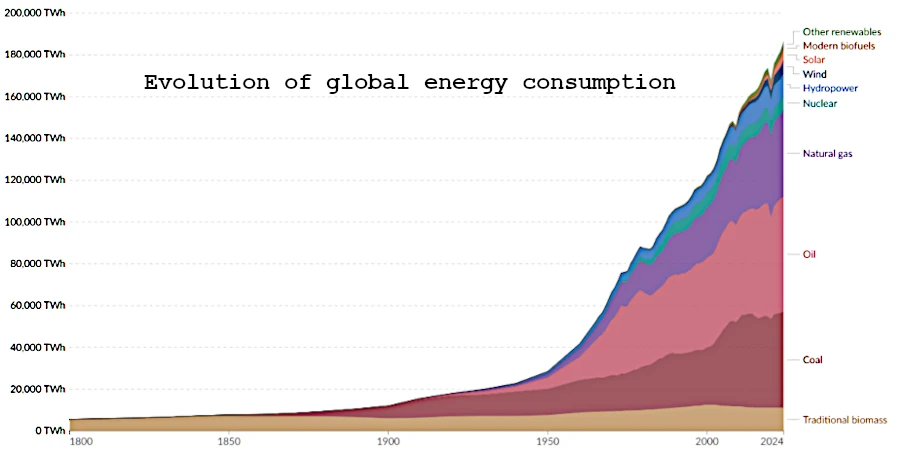
For over two centuries, humanity has transformed increasing amounts of energy to power its machines, industries, and now its digital networks. Each major step in this evolution corresponds to an energy revolution: from steam to coal, from oil to electricity, and from silicon to the era of servers. These transitions tell the story of how our civilization has mastered increasingly dense, efficient, and fast energy sources.
From steam engines to digital servers, humanity has learned to transform heat, light, motion, and now information. Every technological advance is, above all, an energy transformation.
In the 18th century, the steam engine transformed the heat of coal into motion. This was a true revolution: human or animal muscle power was replaced by continuous mechanical power, capable of driving trains, ships, and factories. Energy consumption exploded: humans multiplied their power to act on matter.
Coal became the engine of industrialization. It was a highly concentrated energy source, easy to store and transport. It powered locomotives, blast furnaces, and the emerging production of electricity. In the 19th century, major cities were covered in smoke, a symbol of both progress and the first mass pollution.
In the 20th century, oil took over. It fueled cars, airplanes, and ships, becoming the lifeblood of the global economy. Its energy density was such that a single liter of fuel could propel a car for tens of kilometers. This was the era of mobility, fast transport, and the globalization of trade.
At the same time, electricity established itself as a clean energy source: no smoke, no noise, and easy to transport. It powered motors, lit up cities, and supplied households and industrial machines. Electricity became the universal link between all other forms of energy.
After 1950, humanity discovered nuclear fission. A tiny amount of matter was enough to release colossal energy according to Einstein's famous equation \(\Delta E = \Delta m c^2\). Nuclear power plants produced stable and continuous electricity, but posed new challenges: management of radioactive waste, safety of facilities, and technological dependence.
Since the beginning of the 21st century, a new revolution has been underway: the digital revolution. Computers, smartphones, and data centers are consuming more and more electricity. Behind every internet search, every online video, and every transaction lies an invisible but very real energy consumption. Data centers are now the factories of the digital age. Their efficiency is measured by the ratio of total energy used to that actually devoted to computer servers (the "PUE", for Power Usage Effectiveness).
Faced with climate change and the depletion of fossil resources, the energy question has become crucial. It is no longer just about producing more, but producing better: with renewable energies, smart grids, and less energy-intensive, more efficient systems. The challenge is to maintain our modern needs (mobility, comfort, communication, etc.) while respecting physical balances.
These transformations show that contemporary energy demand is no longer limited to classic needs for transport and heating: energy has become a critical vector for the processing, storage, and transmission of information on a global scale.
N.B.:
In two centuries, the average energy power used per capita has multiplied by more than 20. We now live in a society where information and energy are closely linked: every bit calculated, stored, or transmitted consumes energy somewhere on the planet.
| Period | Coal (%) | Oil (%) | Gas (%) | Nuclear (%) | Hydroelectricity (%) | Solar & Wind (%) | Biomass & others (%) |
|---|---|---|---|---|---|---|---|
| 1850 | ~95 | ~1 | <1 | 0 | ~2 | 0 | ~2 |
| 1900 | ~70 | ~8 | ~2 | 0 | ~10 | 0 | ~10 |
| 1950 | ~40 | ~36 | ~7 | 0 | ~10 | 0 | ~7 |
| 1980 | ~35 | ~37 | ~20 | ~5 | ~8 | 0 | ~5 |
| 2000 | ~28 | ~36 | ~23 | ~6 | ~7 | ~0.5 | ~6.5 |
| 2020 | ~26 | ~31 | ~24 | ~4 | ~6 | ~3 | ~6 |
| 2025 (forecast) | ~25 | ~29 | ~22 | ~5 | ~7 | ~4 | ~7 |
Sources: International Energy Agency (IEA) - IEA; BP Statistical Review of World Energy 2021 - BP.